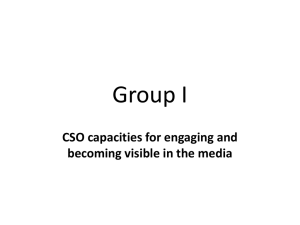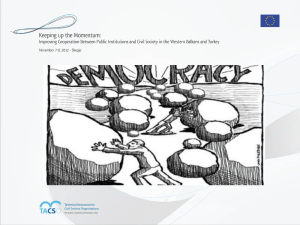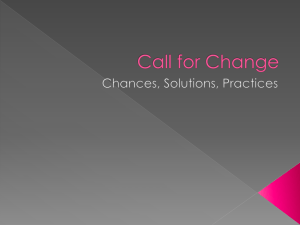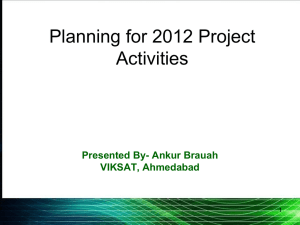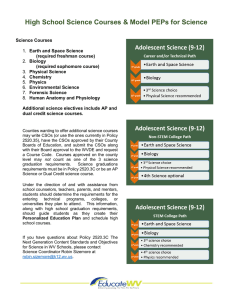CIVIL SOCIETY SPACE REPOR-INPUT BY ACHIRIMBI NGWA JOSEPH INDIGENOUS TRAINING PROGRAMME REPRESENTATIVES
advertisement
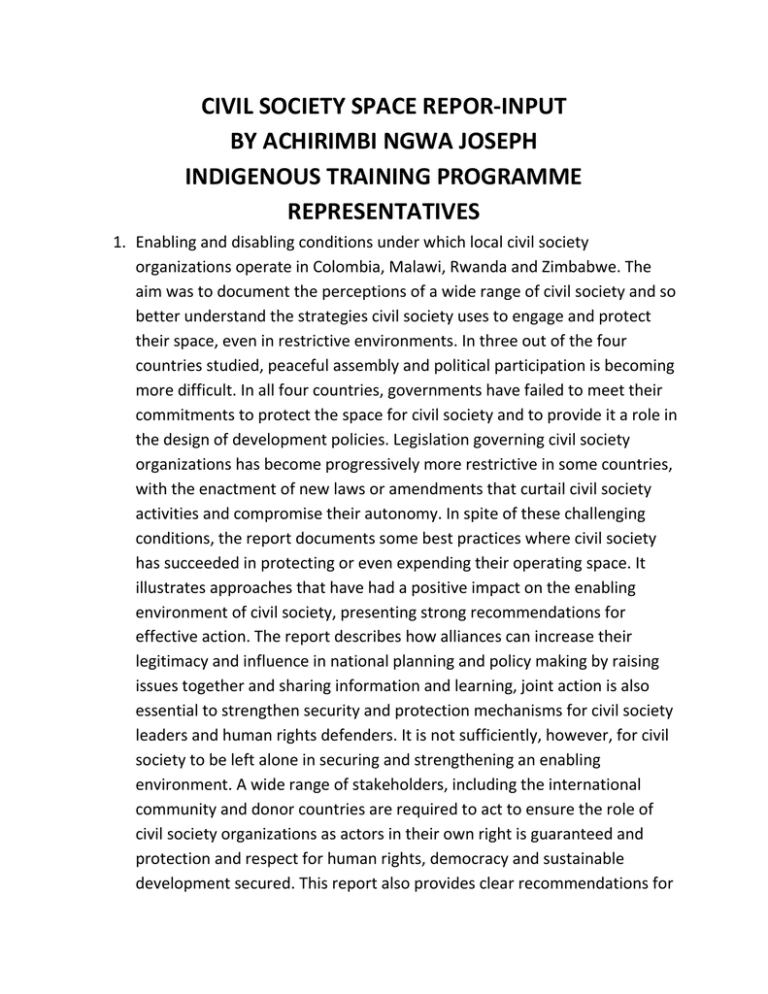
CIVIL SOCIETY SPACE REPOR-INPUT BY ACHIRIMBI NGWA JOSEPH INDIGENOUS TRAINING PROGRAMME REPRESENTATIVES 1. Enabling and disabling conditions under which local civil society organizations operate in Colombia, Malawi, Rwanda and Zimbabwe. The aim was to document the perceptions of a wide range of civil society and so better understand the strategies civil society uses to engage and protect their space, even in restrictive environments. In three out of the four countries studied, peaceful assembly and political participation is becoming more difficult. In all four countries, governments have failed to meet their commitments to protect the space for civil society and to provide it a role in the design of development policies. Legislation governing civil society organizations has become progressively more restrictive in some countries, with the enactment of new laws or amendments that curtail civil society activities and compromise their autonomy. In spite of these challenging conditions, the report documents some best practices where civil society has succeeded in protecting or even expending their operating space. It illustrates approaches that have had a positive impact on the enabling environment of civil society, presenting strong recommendations for effective action. The report describes how alliances can increase their legitimacy and influence in national planning and policy making by raising issues together and sharing information and learning, joint action is also essential to strengthen security and protection mechanisms for civil society leaders and human rights defenders. It is not sufficiently, however, for civil society to be left alone in securing and strengthening an enabling environment. A wide range of stakeholders, including the international community and donor countries are required to act to ensure the role of civil society organizations as actors in their own right is guaranteed and protection and respect for human rights, democracy and sustainable development secured. This report also provides clear recommendations for donors and governments to strengthen and secure an enabling environment for civil society act alliance and CIDSE are committed to advancing these recommendations and to ensuring that they will be brought to the attention of governments and the international community. It is of utmost importance that all laws and regulations restricting civil society activity are amended to ensure the independence, participation and freedoms to which civil society actors are entitled. It is likewise essential that governments involve civil society organizations in the design and implementation of development plans. In particular efforts should be directed at ensuring that indigenous groups, women organizations and other marginalized and disadvantaged groups are able to participate meaningfully in the decision making processes. 2. In many parts of the world the work of civil society organizations is becoming increasingly dangerous civil society actors speak out against social justice despite threats to personal security to defend the human rights of others and to protect the freedoms that contribute a democracy. They hold governments and policy makers to account with the aim of upholding the basic freedoms and rights to which everyone is entitled. In order to operate effectively, civil society must have the space to speak out, to educate, to mobilize and to ensure that everyone can participate in the democratic processes of their country. If these trends are not stopped, the damage to sustainable democracy peace and development would be unimaginable. It has long been acknowledged that a strong and vibrant civil society is a key component of sustainable and legitimate development. Without it, development plans are less likely to achieve their objectives and people are more likely to suffer through inequitable growth and policies that fail to address their needs. In fact, many CSOs and human rights defenders continue to experience increased restrictions on their activities and funding intimidation, excessive use of force, arbitrary detention, enforced disappearances and extra judicial killings. It is a matter of great importance to highlight these issues and to call on governments and international institutions to urgently address them. With this in mind, CIDSE and the act alliance have jointly commissioned this research to documents the trends in Malawi, Rwanda, Zimbabwe and Colombia as indicative of a wider phenomenon. This report draws on interviews and focus groups in each of the stronger voice, a greater ability to access funds and strengthened capacity. This has enabled them to resist governments questioning their legitimacy or threatening their very existence. 3. The European Union communication also highlights important aspects of an enabling environment that are the primary responsibilities of the state. The new European Union approach to engaging with CSOs in external relations has a similar emphasis. An empowered civil society is a crucial component of any democratic system and is an asset in itself. It represents and fosters effective policies, equitable and sustainable development and inclusive growth. Both policy documents include commitments to ensuring an enabling environment for CSOs. These include freedom of expression and association, the right to secure finding, access to information and participation in public life. Today, CSOs are faced with the challenge of working under increasing constraints as many governments limit their operational and political space. These obstacles may be judicial or extra judicial measures, ranging from restrictions on activities and funding to intimidation, excessive use of force, arbitrary detention, enforced disappearances and extra judicial killings. Across the world, human rights defenders are routinely harassed, physically assault, arbitrarily detained and even executed. One victim of extra judicial killings was Peter Suh, a prominent environmental activist, who was shot dead by military police while investigations illegal logging and land seizures in Cameroon. Adaptations of new NGO laws in recent years have imposed severe administrative restrictions on CSOs, particularly those working on advocacy or human rights issues. They bestow sweeping discretionary powers that enable government agencies to ban CSOs from working on certain issues, such as human rights and to dissolve CSOs arbitrarily with no independent over sight. The issue of funding has become a key concern as states restrict foreign funding to prevent CSOs from working on sensitive issues such as human rights. Two examples include legislation, such as the Ethiopian proclamation to provide for the registration and regulation of charities and four countries and provide CSOs with the opportunity to analyze the environment in which they work. The survey involving CSO leader and focus groups of CSO staff reveal some disturbing findings about the environment in which CSOs are working. The findings illustrate a pronounced difference between government commitment to involve CSOs in the design and implementation of development policy and plans, and the actual experiencing of CSOs in all four countries. The climate of fear in which many CSOs operate makes development and human rights work extremely difficult. In addition to insecure working conditions, CSOs are routinely stigmatized for working on issues that challenge prevailing social norms, notably around sexual minorities. Given the role of protect in the struggle for peace and justice, such development is a matter of funding is another contributory factor to recent times. The combination of the financial crisis and a tendency of states to restrict foreign funding for CSOs working on sensitive issues, such as human rights, make the future of CSOs uncertain. They also struggle with the increasing workload that comes with both applying for and administering international donor funds. Legislation around CSO activities has become increasingly restrictive in some countries with new laws being introduced or amended to target the work done by CSOs. For smaller CSOs in particular, capacity is an issue when engaging with government, accessing funding or making their voice heard. In response to restrictive environments, many CSOs have been innovating and adapting and as a result, helping to strengthen or even expand their operating space. As well as gathering data on the ways in which governments have reduced civil society space, this report also aims to document and analyze approaches that have had a positive effect on the enabling environment. As supporters and funding partners of CSOs world wide the member organizations of CIDSE and act alliance who initiated this study, give priority to strengthening and co-operating with civil society in order to move beyond a mere analysis of problems and challenges faced by CSOs the CIDSE working group on enabling environment and the act alliance community of practice on human rights in development decided to conduct research into stakeholder approaches strategies and interventions that contribute positively to the enabling environment for civil society organizations. In order to address shrinking spaces in country stakeholders need data and information to help them identify key difficulties in the enabling environment, help suggest improvements and monitor progress in this context, it is paramount to gather reliable data on CSOs operating environments and the level of political commitment to policies, laws and practices that promote such an environment. Many organizations have felt the need for a tool similar to an index to assess the enabling environment for CSOs in real time and in ways that offer insight into its positive and negative impacts. An analyze of strategies and approaches that have led to improvements in enabling environments has the potential to unlock knowledge and boost learning among CSOs across the world. 4. The aim of the research tool is to generate understanding of the impact of official policies and practices on the enabling environment and their effect on CSOs. The research methodology offers a quick and resource efficient method for testing the supportiveness of the enabling environment for CSOs/NGOs at any given time, in contrast to other indicator systems which are lengthy and costly to implement. The tool is a user’s analysis as users of the enabling environment the research enquires into the experience of CSOs and NGOs. The research is neither an investigation nor an assessment. Rather, it offers a lens through which we can gain new insight and understanding. The research offers a source of reliable analysis and data to form the basis of new or renewed dialogue with government, new strategies of action or reform of specific policies or practices to assist with aid effectiveness. The research methodology uses two research techniques to systematically gather data from two different sources. By triangulating the two sets of data, the research tests and confirms key findings.


